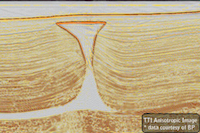Reverse Time Migration (RTM)
Reverse Time Migration (RTM) is an advanced migration method for seismic depth imaging. The strength of RTM stems from the fact that it fully respects the two-way acoustic wave equation, thus improving imaging in areas where complex geology violates the assumptions made in Kirchhoff or one-way wave equation migrations. Until recently, RTM’s widespread use was severely hindered by the enormous computing resources required to process the data. This computational bottleneck is now cleared with Acceleware’s AxRTM™ solution. AxRTM provides the core numerical functionality of Reverse Time Migration as a library that can be integrated into an existing seismic processing framework. AxRTM has a modular architecture supporting a variety of integrator-specific functionality, and currently supports both optimized multi-core CPU and NVIDIA GPU hardware. Cost Effective RTM Angle Gathers In complex geology, traditional RTM offset-domain common image gathers (ODCIG) suffer from artifacts due to multiple paths of wave propagation around complicated structures. The CIGs indexed by subsurface reflection angle suffer much less from migration artifacts for complicated structures, however early implementations of RTM angle gathers have been cost prohibitive. AxRTM’s efficient implementation of true-amplitude ADCIG (in 2D or 3D simulations) can now be used for migration velocity model updating and amplitude versus angle (AVA) analysis. AxRTM’s angle gathers provide a powerful and cost effective tool for validating and improving earth models in complex geology such as beneath salt bodies or gas clouds or in fractured zones. Features and Specifications Below lists major components of the AxRTM library. The architecture of AxRTM is designed to allow for the addition of geophysical functionality in a modular fashion. This allows an Integrator who has their own RTM expertise to incorporate their proprietary methods above and/or into the API.
Listing Details
Visits
1,513
Redirects
300
Don't Miss Out! Get the Best Deal on this Software - Email Us Now!
Map
© OpenStreetMap contributors














